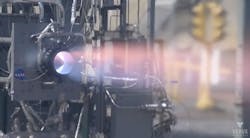Venus Aerospace announces successful test of its rotating detonation rocket engine
HOUSTON - Venus Aerospace in Houston announced a successful partnership with NASA's Marshall Space Flight Center to achieve one of the longest sustained tests of a rotating detonation rocket engine. Venus designs and manufactures hypersonic engines and aircraft for research, defense, and commercial missions and partnered with the National Aeronautics and Space Administration's Marshall Space Flight Center in Huntsville, Alabama for this project.
The goal of this partnership was to test rotating detonation rocket engines (RDREs) in a flight-like manner. The engine injector that Venus Aerospace designed and provided was the highest performing and sustained the longest detonation engine run of the entire campaign. Using a regeneratively-cooled RDRE architecture, the engine successfully operated for 4 minutes of hotfire testing. Most engine tests of this type last for only 1-2 seconds. This long-duration hotfire means RDRE's have retired a major risk area and can move into the few remaining steps before a flight demonstration.NASA is considering using RDREs for in-space applications such as lunar and martian landers, in-space operations and logistics, and other deep-space missions. Because RDREs are much smaller and more efficient than traditional rocket engines and can be easily configured for hypersonic vehicles, Venus' capabilities are uniquely versatile.
This partnership with NASA will accelerate Venus's research and development, thus allowing for the proven scalability of its technology and advancing the team's mission to unlock the hypersonic economy. NASA and Venus both work independently, collaborating on special projects to strengthen their respective research and development.
Venus has entered into a second-year contract with NASA to provide engine parts for research and development of NASA's RDRE. In year two, with Venus's support, NASA will test different propellant combinations on hardware to operate at even higher thrust levels and demonstrate efficiency gains promised by the detonation engine. This will help Venus expand its knowledge base and move technology onto flight vehicles.
"Venus believes strongly in the performance step-change that RDREs bring for both hypersonic and space applications. The partnership with NASA has been key in maturing this new technology" says Dr. Andrew Duggleby, CTO and co-founder of Venus Aerospace.
